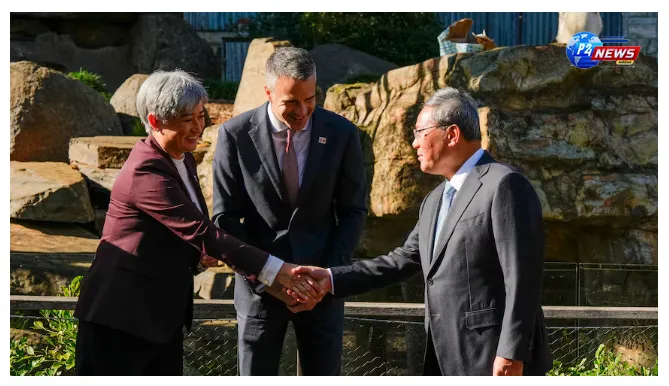During Premier Li Qiang's visit to Australia, it was revealed that two new pandas would be arriving, generating excitement and anticipation for wildlife enthusiasts and conservation efforts in both countries.
During Premier Li Qiang's visit to Australia, it was revealed that two new pandas would be arriving, generating excitement and anticipation for wildlife enthusiasts and conservation efforts in both countries.
The Adelaide Zoo is set to welcome two new pandas, Yi Lan and Xing Qiu, replacing the beloved pair Wang Wang and Fu Ni, who recently returned to their homeland in China. The arrival of these new residents comes after 15 years where the previous pandas endeared themselves to the public, despite the challenges they faced in attempts to reproduce. Their time in Adelaide will be remembered fondly, even if their legacy did not include the successful birth of a cub.
The freshly introduced pandas, Yi Lan and Xing Qiu, carry names rich in meaning. Yi Lan, pronounced as "ee-luhn," translates to "idly blissful," while Xing Qiu, pronounced "shing chee-y-uhl," means "autumn star." These names reflect a cultural significance that goes beyond mere identification. The unveiling of these pandas took place in August, heralding a new era for the zoo. Adelaide Zoo has secured a decade-long agreement to loan this dynamic duo for an estimated cost of $1.5 million per year. Following their arrival from Dujiangyan, China, they will undergo a quarantine period prior to their public debut in mid-January.
The announcement regarding the new pandas was made by Chinese Premier Li Qiang during his visit to Adelaide Zoo in June. This visit marked a notable moment, as it was the first by a senior Chinese leader to Australia in seven years. Alongside the unveiling of the pandas, Premier Li also engaged with Australian Prime Minister Anthony Albanese in Canberra, indicating a strategic effort to mend and strengthen diplomatic ties.
Panda diplomacy refers to the intricate political dynamics involved when China loans pandas to various zoos around the world. This practice has seen countries like Australia, the United States, and Germany hosting these iconic creatures. According to international relations expert Michael Sullivan from Flinders University, such diplomacy serves as a form of "soft power" for China, allowing it to enhance its global image. He elaborates that the Chinese government is deeply concerned about its international standing and has directed significant efforts to improve how China is perceived globally; panda diplomacy is a crucial component of this strategy.
This diplomatic approach stands in contrast to "hard power" tactics, such as imposing economic sanctions. For instance, in 2020, China levied heavy tariffs on Australian exports, including coal and wine, following Australia's demand for an inquiry into the origins of COVID-19. Since then, some of those tariffs have been lifted, demonstrating the shifting political landscape.
Professor Czeslaw Tubilewicz from Adelaide University elucidated that Premier Li's visit to the zoo was a calculated maneuver to foster better relations with Australia, particularly after the fallout from economic sanctions that had strained bilateral ties.
Beyond the political implications, Dr. Sullivan emphasized the cultural and scientific dimensions underlying the loan of pandas. The process is meticulous, with careful consideration of the habitats to ensure they are suitable for the pandas, thereby enabling research opportunities. There is also a shared hope that Yi Lan and Xing Qiu may produce a panda cub, which would be a joyful event both scientifically and diplomatically. As Dr. Sullivan mentioned, the potential birth of panda babies could symbolize an improvement in relations.
However, Professor Tubilewicz holds a more skeptical view regarding the effectiveness of panda diplomacy in genuinely enhancing China's image globally. He posits that while the introduction of new pandas signifies a desire to maintain amicable relations, it does not necessarily reflect the broader political climate. Historically, he notes that despite diplomatic tensions, the pandas have remained in their host countries, regardless of the state of relationships between nations.
The arrival of these new pandas represents not only a continuation of a cherished tradition at Adelaide Zoo but also a significant chapter in the ongoing dialogue between Australia and China. With hopes riding high for both a successful display and the possibility of panda cubs, the community eagerly awaits the next developments involving Yi Lan and Xing Qiu.
Like
Dislike
Love
Angry
Sad
Funny
Pray
'Trump Tracker: Tulsi Gabbard's Surprising Appointment as US Intelligence Chief
November 14, 20249th Ayurveda Day in Melbourne: A Celebration of Ayurvedic Innovations and Global Health Impact
November 10, 2024🍪 We Value Your Privacy and Experience Hi there! We use cookies to enhance your browsing experience, provide personalized content, and analyze site traffic. By continuing to use our site, you consent to our use of cookies.







Comments 0